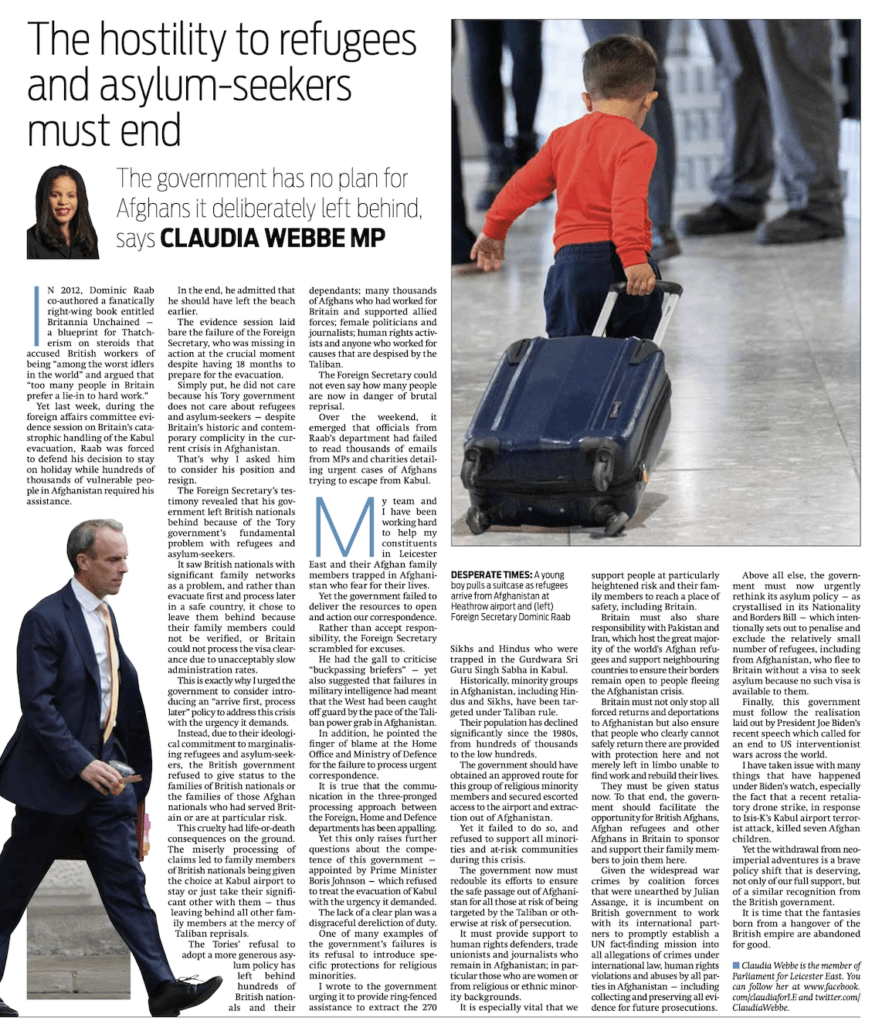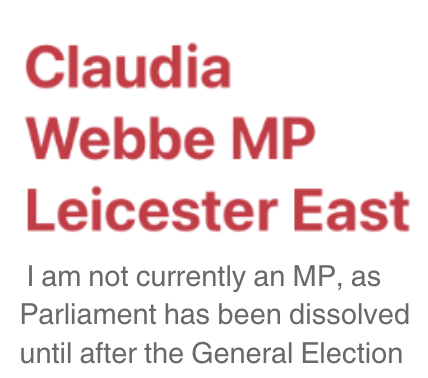
The hostility to refugees and asylum-seekers must end
By Claudia Webbe
The government has no plan for Afghans it deliberately left behind, says CLAUDIA WEBBE MP
In 2012, Dominic Raab co-authored a fanatically right-wing book entitled Britannia Unchained — a blueprint for Thatcherism on steroids that accused British workers of being “among the worst idlers in the world” and argued that “too many people in Britain prefer a lie-in to hard work.”
Yet last week, during the foreign affairs committee evidence session on Britain’s catastrophic handling of the Kabul evacuation, Raab was forced to defend his decision to stay on holiday while hundreds of thousands of vulnerable people in Afghanistan required his assistance.
In the end, he admitted that he should have left the beach earlier.
The evidence session laid bare the failure of the Foreign Secretary, who was missing in action at the crucial moment despite having 18 months to prepare for the evacuation.
Simply put, he did not care because his Tory government does not care about refugees and asylum-seekers — despite Britain’s historic and contemporary complicity in the current crisis in Afghanistan.
That’s why I asked him to consider his position and resign.
The Foreign Secretary’s testimony revealed that his government left British nationals behind because of the Tory government’s fundamental problem with refugees and asylum-seekers.
It saw British nationals with significant family networks as a problem, and rather than evacuate first and process later in a safe country, it chose to leave them behind because their family members could not be verified, or Britain could not process the visa clearance due to unacceptably slow administration rates.
This is exactly why I urged the government to consider introducing an “arrive first, process later” policy to address this crisis with the urgency it demands.
Instead, due to their ideological commitment to marginalising refugees and asylum-seekers, the British government refused to give status to the families of British nationals or the families of those Afghan nationals who had served Britain or are at particular risk.
This cruelty had life-or-death consequences on the ground. The miserly processing of claims led to family members of British nationals being given the choice at Kabul airport to stay or just take their significant other with them — thus leaving behind all other family members at the mercy of Taliban reprisals.
The Tories’ refusal to adopt a more generous asylum policy has left behind hundreds of British nationals and their dependants; many thousands of Afghans who had worked for Britain and supported allied forces; female politicians and journalists; human rights activists and anyone who worked for causes that are despised by the Taliban.
The Foreign Secretary could not even say how many people are now in danger of brutal reprisal.
Over the weekend, it emerged that officials from Raab’s department had failed to read thousands of emails from MPs and charities detailing urgent cases of Afghans trying to escape from Kabul.
My team and I have been working hard to help my constituents in Leicester East and their Afghan family members trapped in Afghanistan who fear for their lives.
Yet the government failed to deliver the resources to open and action our correspondence.
Rather than accept responsibility, the Foreign Secretary scrambled for excuses.
He had the gall to criticise “buckpassing briefers” — yet also suggested that failures in military intelligence had meant that the West had been caught off guard by the pace of the Taliban power grab in Afghanistan.
In addition, he pointed the finger of blame at the Home Office and Ministry of Defence for the failure to process urgent correspondence.
It is true that the communication in the three-pronged processing approach between the Foreign, Home and Defence departments has been appalling.
Yet this only raises further questions about the competence of this government — appointed by Prime Minister Boris Johnson — which refused to treat the evacuation of Kabul with the urgency it demanded.
The lack of a clear plan was a disgraceful dereliction of duty.
One of many examples of the government’s failures is its refusal to introduce specific protections for religious minorities.
I wrote to the government urging it to provide ring-fenced assistance to extract the 270 Sikhs and Hindus who were trapped in the Gurdwara Sri Guru Singh Sabha in Kabul.
Historically, minority groups in Afghanistan, including Hindus and Sikhs, have been targeted under Taliban rule.
Their population has declined significantly since the 1980s, from hundreds of thousands to the low hundreds.
The government should have obtained an approved route for this group of religious minority members and secured escorted access to the airport and extraction out of Afghanistan.
Yet it failed to do so, and refused to support all minorities and at-risk communities during this crisis.
The government now must redouble its efforts to ensure the safe passage out of Afghanistan for all those at risk of being targeted by the Taliban or otherwise at risk of persecution.
It must provide support to human rights defenders, trade unionists and journalists who remain in Afghanistan; in particular those who are women or from religious or ethnic minority backgrounds.
It is especially vital that we support people at particularly heightened risk and their family members to reach a place of safety, including Britain.
Britain must also share responsibility with Pakistan and Iran, which host the great majority of the world’s Afghan refugees and support neighbouring countries to ensure their borders remain open to people fleeing the Afghanistan crisis.
Britain must not only stop all forced returns and deportations to Afghanistan but also ensure that people who clearly cannot safely return there are provided with protection here and not merely left in limbo unable to find work and rebuild their lives.
They must be given status now. To that end, the government should facilitate the opportunity for British Afghans, Afghan refugees and other Afghans in Britain to sponsor and support their family members to join them here.
Given the widespread war crimes by coalition forces that were unearthed by Julian Assange, it is incumbent on British government to work with its international partners to promptly establish a UN fact-finding mission into all allegations of crimes under international law, human rights violations and abuses by all parties in Afghanistan — including collecting and preserving all evidence for future prosecutions.
Above all else, the government must now urgently rethink its asylum policy — as crystallised in its Nationality and Borders Bill — which intentionally sets out to penalise and exclude the relatively small number of refugees, including from Afghanistan, who flee to Britain without a visa to seek asylum because no such visa is available to them.
Finally, this government must follow the realisation laid out by President Joe Biden’s recent speech which called for an end to US interventionist wars across the world.
I have taken issue with many things that have happened under Biden’s watch, especially the fact that a recent retaliatory drone strike, in response to Isis-K’s Kabul airport terrorist attack, killed seven Afghan children.
Yet the withdrawal from neoimperial adventures is a brave policy shift that is deserving, not only of our full support, but of a similar recognition from the British government.
It is time that the fantasies born from a hangover of the British empire are abandoned for good.
Claudia Webbe MP is the member of Parliament for Leicester East. You can follow her at www.facebook.com/claudiaforLE and twitter.com/ClaudiaWebbe


